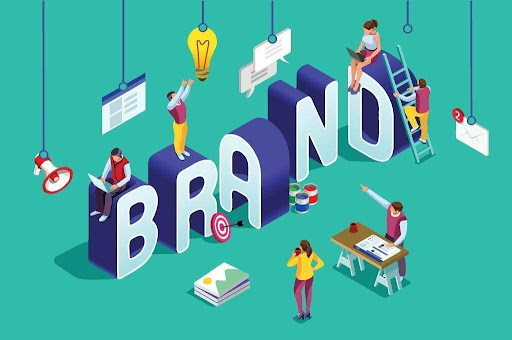Unveiling the Significance of Logos in Business Branding

As a visual expression of a company’s identity, logos are essential to commercial branding. They are an essential component of brand communication and greatly influence how people view a company. Here are a few explanations of the importance of logos in corporate branding.
Instant Recognition:
To help customers quickly and effectively connect with and remember a brand, logos are essential to brand awareness. A well-designed logo can create a significant visual impression that sticks in people’s minds. When the occasion arises, this imprint helps with easy recollection and recognition of a business. The importance of logos comes from their capacity to represent a brand’s core principles and essence in addition to their visual attractiveness. A strong and enduring brand image can be built by a company using a well-designed logo to communicate its identity clearly and memorably, leaving a lasting impression on consumers.
Brand Identity:
A brand’s identity is mostly established by its logo, which captures the essence of an organization’s beliefs, mission, and personality. Strictly created logos are more than just visual components; they are strong communicators that capture a brand’s story. It concisely summarizes a business’s history, encouraging audience recognition and instantaneous connection. A well-designed logo is more than simply a symbol; it’s a tactical instrument that helps a business stand out in the crowded market and impact customers. As a crucial component of brand strategy, logos help create a distinctive and memorable identity that connects with the target market and greatly enhances a company’s overall success.
Expertise:
A well-designed and polished logo is a company’s visual representative, conveying competence and credibility. Its design draws attention and leaves a lasting impression, implying the business’s experience, reliability, and commitment to quality. Beyond mere aesthetics, a thoughtfully designed logo becomes a powerful emblem of the company’s identity, building a strong brand image. A memorable logo sets a brand apart in the cutthroat business world, building confidence and drawing in new clients. A logo may be a powerful tool for building a firm foundation, boosting client confidence, and reaffirming a commitment to providing high-quality products or services since it embodies professionalism.
Distinctions:
Logos are essential for differentiating companies in a crowded market. Logos act as a unique identifier and are essential to creating a visual identity that sets a business apart from competitors. A skillfully designed logo may be a potent tool for brand differentiation in a competitive market, helping customers identify and connect with a certain company. A best logo design company UK is essential to building a strong brand identity. Serving as a visual representative of the company, it embodies its core principles and values, promoting customer engagement and brand loyalty. A well-crafted logo becomes a timeless representation of the company, impacting viewers and solidifying their perception.
Continuity:
To create and preserve brand consistency across a variety of marketing platforms, logos are essential. A consistent logo upholds the brand’s identity, whether displayed on a website, business card, social media profile, or promotional materials, giving customers a sense of trustworthiness and familiarity. The brand’s story, values, and merchandise are visually connected when a logo is used consistently throughout these platforms. Because of this consistency, customers are more likely to recognize and trust the brand because they always see the same logo across all platforms. Logos serve as a visual shorthand for the brand, bridging communication gaps and making a big impression on the audience’s perception of the company.
Emotional Bond:
Logos are effective instruments that arouse feelings and create strong customer bonds. An expertly designed logo can elicit favorable emotions and solid associations, which can develop brand loyalty and affinities. A well-designed logo communicates a brand’s identity and values concisely, going beyond simple aesthetic appeal. Beyond language barriers, this visual representation becomes a universal symbol of trust and recognition. Logos become a means of evoking strong feelings in consumers through color schemes, symbolism, and strategic design elements. Logos can go beyond aesthetics and play a crucial role in creating long-lasting connections between brands and their target market.
The Ability To Scale:
Creating a logo that is both scalable and versatile is essential to ensure that it works well in a variety of contexts and sizes, from small business cards to large billboards. An effective logo goes beyond these boundaries without losing effectiveness or recognition. Its adaptability becomes especially important in today’s complex media landscape, where a logo may appear on websites, social media profiles, print materials, and more. A well-designed logo is always consistent and readable when enlarged on a large physical surface or a tiny digital screen. This ability to resound consistently across multiple platforms improves the coherence of the brand and guarantees that the visual representation maintains its impact and memorability regardless of scale or context.
Memorable Brand:
Creating a memorable and well-designed logo is essential to improving brand recall. Customers become cognitively connected to the logo through repeated exposure, causing it to become ingrained in their memory. Because it promotes immediate recognition and trust, this retention is essential for building brand loyalty. In addition to strengthening a brand’s identity, a strong logo is an effective tool for word-of-mouth advertising. Customers are more inclined to share positive experiences and naturally promote a brand when they can quickly recall and identify it. Consequently, strategically investing in a unique and memorable logo creates a strong impression in customers’ minds, encouraging brand loyalty and propelling business success.
Flexibility:
A successful logo must be flexible in the ever-changing design trends and markets. Although the logo’s timeless quality is still important, it must also fit new design trends. A brand’s ability to keep up with the times is reflected in the adaptability factor, which guarantees that the logo remains relevant and resonates with modern audiences. This duality, which embraces change while retaining a timeless essence, gives logos the resilience to withstand changing market environments and aesthetics. Finding the correct balance allows a brand to remain current and relevant despite shifting design sensibilities, connect with various consumers, and convey a lasting identity.
Legal Security:
A company’s logo is essential to its brand identity, and maintaining its uniqueness through legal protection via trademarks is critical. Due to their ability to prevent unauthorized use of a company’s logo and guarantee exclusive rights to its visual representation, trademarks offer a legal shield. Doing this protects the brand’s identity, and possible consumer confusion in the market is avoided. Companies can establish ownership if they professional web design and development services in UK and pursue legal action against infringement by registering their trademarks. Retaining customer trust and increasing brand recognition depend heavily on this protection. Trademark lawfully protecting logos is crucial for companies looking to protect their distinctive visual identity and keep a competitive advantage in the market.
Conclusion:
In summary, a company’s logo greatly influences how people perceive and remember it, making it an essential component of the brand identity of the enterprise. An expertly created logo is more than just a picture; it’s a potent symbol of the company’s identity, ethos, and values. A strong logo has a purposeful investment beyond aesthetics to connect with customers and create a long-lasting impression. These logos become a permanent part of the story behind the brand and help it succeed over the long run by building trust and recognition. Thus, companies ought to acknowledge logos’ significant impact in the marketplace and consider them vital resources that can help a brand achieve long-term success and recognition.




